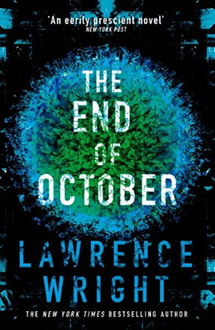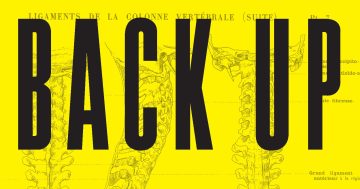Reviewed by Robert Goodman.
By Lawrence Wright, Penguin Random House, $32.99.
 There are a number of ways readers could respond to the current Covid-19 pandemic. They can take refuge in books that provide them with some comfort – old favourites, cosy crime fiction or historical dramas which take place in familiar environments and have happy or at least satisfying endings. Or they can dive deep into pandemic fiction. Plenty of people are rereading books like The Stand, The Andromeda Strain or Station Eleven, or rewatching the 2011 Soderbergh film Contagion. If you fall into the second group then a book like The End of October by journalist Lawrence Wright should fit the bill. Wright is best known for The Looming Tower his non-fiction examination of 9/11 which won the Pulitzer Prize. The End of October, while fiction, brings his journalistic skills to bear, which is probably why it turns out to be so prescient of the time we find ourselves in.
There are a number of ways readers could respond to the current Covid-19 pandemic. They can take refuge in books that provide them with some comfort – old favourites, cosy crime fiction or historical dramas which take place in familiar environments and have happy or at least satisfying endings. Or they can dive deep into pandemic fiction. Plenty of people are rereading books like The Stand, The Andromeda Strain or Station Eleven, or rewatching the 2011 Soderbergh film Contagion. If you fall into the second group then a book like The End of October by journalist Lawrence Wright should fit the bill. Wright is best known for The Looming Tower his non-fiction examination of 9/11 which won the Pulitzer Prize. The End of October, while fiction, brings his journalistic skills to bear, which is probably why it turns out to be so prescient of the time we find ourselves in.
The hero of The End of October is a scientist, so from the beginning it is clear this is a work of fiction. Doctor Henry Parsons works for the Centre for Disease Control and flies to Indonesia on behalf of the World Health Organisation to explore the outbreak of a new deadly form of the flu in a refugee camp. Unbeknown to him his taxi driver picks up the disease and takes it with him on the Hajj, unwittingly spreading this new, deadly strain to the millions of pilgrims who have come to Mecca. Despite attempts at lockdown, the disease, now known as Kongoli, spreads and before long it is a global pandemic, one far deadlier than the current Covid crisis. The rest of the book documents the race against time to find a cure and the ongoing and worsening global impacts of the virus.
Hidden inside the pandemic narrative is a protothriller that particularly focusses on Russia and its attempts to expand its influence or cripple America. Given the way in which many aspects of the current global response are playing out at the moment this part of the book feels like a throwback to the thrillers of the 1980s. Besides Kongoli’s Asian beginnings, the novel does not shift its focus away from the Middle East and Russia for most of its length. While it is difficult for any novel to take truly global approach, the absence of plot relating to China, Europe, Africa or South America makes the whole feel like a Cold War throwback.
But most people will not be reading this book for the plot. Rather, they will be interested in the way that journalist Wright works in all of his accumulated knowledge about deadly viruses and how humanity has responded to them. Through this book readers are likely to learn everything they need to know about the 1918 flu pandemic, the curing of smallpox through the invention of the vaccine, and plenty of other deadly diseases including Ebola, polio, marberg and SARS. More scary still is a subplot that involves the creation, recreation and storage of deadly viruses as potential biological weapons by scientists in the US and Russia (and by extrapolation, plenty of other places in the world).
Wright’s journalistic instincts mean that he manages to predict and reflect many of the real world responses to the current pandemic, particularly in the US. For example this prescient passage about the rise and spread of conspiracy theories and its impact on disease control:
According to one theory, Muslims had created the disease to destroy Christian civilization. Another theory posited that Muslims were being targeted for elimination by neo-Nazi scientists. A third postulated a worldwide war against homosexuals. These fantasies were promulgated in social media, led by Russian bots and amplified by internet rumour-mongers, stirring strife by remote control, urging people to take to the streets when they had been warned repeatedly to shelter at home.
The End of October is not the page turner that it sets out to be. It is too heavily laden with exposition about viruses and a backstory that puts Henry in the forefront of combating them. The evil mastermind plot that emerges late in the piece does not generate the tension that it is intended to create and is dealt with in an almost offhanded way. But the book is fascinating and frightening given it was written well before the outbreak of Covid-19. Readers’ interest will be in a scenario in which a very similar virus appears that is as contagious but more deadly and then considers how the world might respond. So for those who can not get enough pandemic fiction, or even pandemic fact, this book will absolutely fit the bill.
This and 500 more reviews can be found at www.pilebythebed.com.








